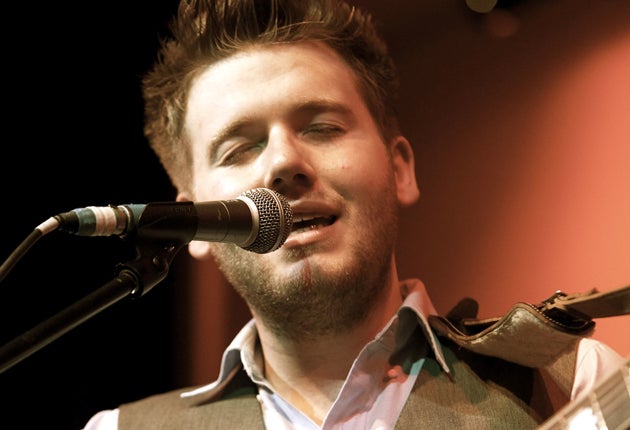Liam Frost, Notting Hill Tabernacle, London
Bright outlook for the rain man

Your support helps us to tell the story
From reproductive rights to climate change to Big Tech, The Independent is on the ground when the story is developing. Whether it's investigating the financials of Elon Musk's pro-Trump PAC or producing our latest documentary, 'The A Word', which shines a light on the American women fighting for reproductive rights, we know how important it is to parse out the facts from the messaging.
At such a critical moment in US history, we need reporters on the ground. Your donation allows us to keep sending journalists to speak to both sides of the story.
The Independent is trusted by Americans across the entire political spectrum. And unlike many other quality news outlets, we choose not to lock Americans out of our reporting and analysis with paywalls. We believe quality journalism should be available to everyone, paid for by those who can afford it.
Your support makes all the difference.When you use a quotation from American novelist and "poet of the gutter" Charles Bukowski, as Liam Frost has done for the title of his latest album, We Ain't Got No Money, Honey, But We Got Rain, it comes with a slice of discontent and depression that's impossible to ignore. As a line, it could just as easily have been penned by the Mancunian singer-songwriter himself.
Thankfully, depression is not on the menu tonight, with Frost rattling through a 15-song set of material from the recent album and 2006's Show Me How the Spectres Dance, with a smile on his face. The Tabernacle, illuminated by the kind of rainbow lights beloved of school discos the world over, is a cheery setting for material that careers between upbeat indie pop and melancholy folk with little hesitation.
It was Guy Garvey of Elbow who called Frost "the UK's answer to Bright Eyes" back in 2006, but as a categorisation it has never quite fitted; though Conor Oberst and Frost share a poetic folksy style, where Bright Eyes' tales of heartbreak and loss are built on guilt and acts of amoral indecency, Frost's lyrical persona is honest and charmingly innocent. Not quite relaxed, onstage he revels in half-told anecdotes, jokes murmured beneath the microphone and, at one point, an offer to drive a member of the audience back up North with the band.
The strongest material is drawn from Frost's new album, which, after taking a year to write and record looked like it might not make it to release when Frost parted ways with his record label. Luckily for everyone he convinced them to let him keep the master tapes, and has since released the record himself. Collaborations with Ed Harcourt and "Your Hand in Mine", a duet recorded sight unseen with Martha Wainwright, have ensured it has sold better than his first.
Tonight's band, some of whom are performing live together for the first time, are understandably shaky at points. They don't hit their stride until they rejoin Frost after a solo section in the middle of the show, in which "Try Try Try" and the impressive "Skylark Avenue" are delivered with the intensity that drew some of Frost's earliest plaudits. "The Mourners of St Paul's", which closes the set, with its brief allusions to "What a Wonderful World", marks one of the moments where Frost's accomplishments as a solo performer and the support of a full band come together best, building on the successes of earlier highlights "Shall We Dance" and "Younger Boys, Older Girls".
Famously, Charles Bukowski's gravestone is inscribed with the immortal words "Don't try", but presuming Frost is a fan, it's advice he's chosen not to take. As far as journeys to the Notting Hill Tabernacle go, his has been longer and tougher than most; but judging from the reception he gets when he returns, solo, to the stage to perform an encore of "Orchestra of Love", it's been more than worth the effort.
Join our commenting forum
Join thought-provoking conversations, follow other Independent readers and see their replies
Comments